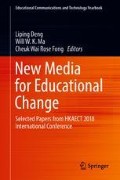Abstract
With the online learning platform used widely, learners’ behavior in online system should be an important element to assess the achievement and reflect the learning process. This paper proposes an approach to analyze the students’ behavior in Moodle’s online forum by a two-dimensional framework. One dimension is toward the interaction activities among peers’ posts in online forum. Another dimension is described by word clouds related to learning contents of the posts. The students’ learning behavior patterns are analyzed and described. It found that there is high correlation between the participating in online forum and achievement. The framework is helpful to design the architecture of automatically recommended system and adaptive learning system in the future.
Access this chapter
Tax calculation will be finalised at checkout
Purchases are for personal use only
References
Berland, M., Baker, R. S., & Blikstein, P. (2014). Educational data mining and learning analytics: Applications to constructionist research. Technology, Knowledge and Learning, 19(1–2), 205–220.
Bienkowski, M., Feng, M., & Means, B. (2012). Enhancing teaching and learning through educational data mining and learning analytics: An issue brief. Available: https://tech.ed.gov/wp-content/uploads/2014/03/edm-la-brief.pdf.
Blikstein, P., Worsley, M., Piech, C., Sahami, M., Cooper, S., & Koller, D. (2014). Programming pluralism: Using learning analytics to detect patterns in the learning of computer programming. Journal of the Learning Sciences, 23(4), 561–599.
da Silveira Espindola, L., & Silveira, M. S. (2017). Self-expression and discourse continuity in a multilevel EUD environment: The case of Moodle. Journal of Visual Languages & Computing, 40, 36–50.
Fidalgo-Blanco, Á., Sein-Echaluce, M. L., García-Peñalvo, F. J., & Conde, M. Á. (2015). Using learning analytics to improve teamwork assessment. Computers in Human Behavior, 47, 149–156.
Losh, E. (Ed.). (2017). MOOCs and their afterlives: Experiments in scale and access in higher education. Chicago: The University of Chicago Press.
Meza-Fernández, S., & Sepúlveda-Sariego, A. (2017). Representational model on Moodle’s activity: Learning styles and navigation strategies. International Journal of Educational Technology in Higher Education, 14(1), 14.
Serrano-Laguna, Á., Torrente, J., Moreno-Ger, P., & Fernández-Manjón, B. (2012). Tracing a little for big improvements: Application of learning analytics and videogames for student assessment. Procedia Computer Science, 15, 203–209.
Siemens, G. (2011). Learning and knowledge analytics: Knewton – The future of education? Retrieved from: http://www.learninganalytics.net/?p=126.
Stich, A. E., & Reeves, T. D. (2017). Massive open online courses and underserved students in the United States. The Internet and Higher Education, 32, 58–71.
Thomas, S. (2016). Future ready learning: Reimagining the role of technology in education. 2016 National Education Technology Plan. Office of Educational Technology, US Department of Education.
Vu, P., Fredrickson, S., & Moore, C. (Eds.). (2016). Handbook of research on innovative pedagogies and technologies for online learning in higher education. Hershey, PA: IGI Global.
Wise, A. F., Cui, Y., Jin, W., & Vytasek, J. (2017). Mining for gold: Identifying content-related MOOC discussion threads across domains through linguistic modeling. The Internet and Higher Education, 32, 11–28.
Acknowledgment
This study is supported by the Undergraduate Students Research Fund of East China University of Science and Technology (ECUST).
Author information
Authors and Affiliations
Corresponding authors
Editor information
Editors and Affiliations
Rights and permissions
Copyright information
© 2018 Springer Nature Singapore Pte Ltd.
About this paper
Cite this paper
Hu, Q., Huang, Y. (2018). A Framework for Analysis Learning Pattern Toward Online Forum in Programming Course. In: Deng, L., Ma, W., Fong, C. (eds) New Media for Educational Change. Educational Communications and Technology Yearbook. Springer, Singapore. https://doi.org/10.1007/978-981-10-8896-4_6
Download citation
DOI: https://doi.org/10.1007/978-981-10-8896-4_6
Published:
Publisher Name: Springer, Singapore
Print ISBN: 978-981-10-8895-7
Online ISBN: 978-981-10-8896-4
eBook Packages: EducationEducation (R0)

